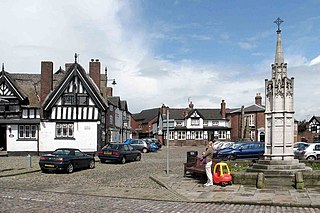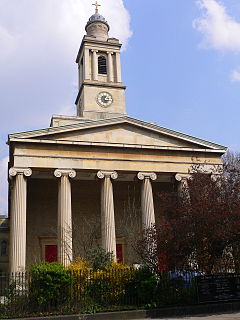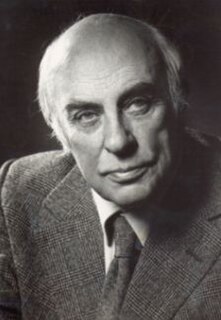"Stormy Weather" is a 1933 torch song written by Harold Arlen and Ted Koehler. Ethel Waters first sang it at The Cotton Club night club in Harlem in 1933 and recorded it that year, and in the same year it was sung in London by Elisabeth Welch and recorded by Frances Langford. Also 1933, for the first time in history the entire floor revue from Harlem's Cotton Club went on tour, playing theatres in principal cities. The revue was originally called The Cotton Club Parade of 1933 but for the road tour it was changed to the Stormy Weather Revue and as the name implies, the show contained the hit song "Stormy Weather" which was sung by Adelaide Hall.
The Keeper or Master of the Rolls and Records of the Chancery of England, known as the Master of the Rolls, is the second-most senior judge in England and Wales after the Lord Chief Justice, and serves as President of the Civil Division of the Court of Appeal and Head of Civil Justice. The position dates from at least 1286, although it is believed that the office probably existed earlier than that.

Elijah, Op. 70, MWV A 25, is an oratorio written by Felix Mendelssohn. It premiered in 1846 at the Birmingham Festival. It depicts events in the life of the Biblical prophet Elijah, taken from the books 1 Kings and 2 Kings of the Old Testament.

Sir Karl William Pamp Jenkins is a Welsh musician and composer. His best known works include the song "Adiemus" and the Adiemus album series; Palladio; The Armed Man; and his Requiem.

Sandbach is a market town and civil parish in the unitary authority of Cheshire East and the ceremonial county of Cheshire, England. The civil parish contains four settlements; Sandbach itself, Elworth, Ettiley Heath and Wheelock.

Aldermaston is a mostly rural, dispersed settlement, civil parish and electoral ward in Berkshire, England. In the United Kingdom Census 2011, the parish had a population of 1015. The village is in the south the mid-Kennet alluvial plain and bounds to the south Hampshire. It is roughly equidistant from Newbury, Basingstoke and Reading, centred 46 miles (74 km) west-by-south-west of London.
Dame Felicity Ann Emwhyla Lott, is an English soprano.
The Armed Man is a Mass by Welsh composer Karl Jenkins, subtitled "A Mass for Peace". The piece was commissioned by the Royal Armouries Museum for the Millennium celebrations, to mark the museum's move from London to Leeds, and it was dedicated to victims of the Kosovo crisis. Like Benjamin Britten's War Requiem before it, it is essentially an anti-war piece and is based on the Catholic Mass, which Jenkins combines with other sources, principally the 15th-century folk song "L'homme armé" in the first and last movements. It was written for SATB chorus with soloists and a symphonic orchestra. Guy Wilson, then master of the museum, selected the texts for the mass.

Howard Lindsay Goodall CBE is an English composer of musicals, choral music and music for television. He also presents music-based programmes for television and radio, for which he has won many awards. In May 2008 he was named as a presenter and Composer-in-Residence with the UK radio channel Classic FM, and in May 2009 he was named "Composer of the Year" at the Classic BRIT Awards.
Samuel Hans Adler is an American composer, conductor, author, and professor. During the course of a professional career which ranges over six decades he has served as a faculty member at both the University of Rochester's Eastman School of Music and the Juilliard School. In addition, he is credited with founding and conducting the U.S. Seventh Army's Seventh Army Symphony Orchestra which participated in the cultural diplomacy initiatives of the United States in Germany and throughout Europe in the aftermath of World War II.
Martin Martin was a Scottish writer best known for his work A Description of the Western Islands of Scotland. This book is particularly noted for its information on the St Kilda archipelago. Martin's description of St Kilda, which he visited in 1697, had also been published some years earlier as A Late Voyage to St Kilda (1698).

Kerry Andrew is an English composer, performer and author.
The National Youth Choirs of Great Britain (NYCGB) is the family of choirs for outstanding young singers, and those with outstanding potential, in the United Kingdom. It comprises a total of five choirs for around 750 young people between the ages of 9 and 25:
Melbourne Gay and Lesbian Chorus (MGLC) was founded in Australia in 1990 by gay performer and activist, Lawrence McGuire. The chorus was first named ALSOUNDS, due in part to its affiliation with the ALSO Foundation. In April 1994, the name was changed to Melbourne Gay and Lesbian Chorus, reflecting the chorus's organisational independence and a desire to further challenge stereotypes.
The Aldermaston marches were anti-nuclear weapons demonstrations in the 1950s and 1960s, taking place on Easter weekend between the Atomic Weapons Research Establishment at Aldermaston in Berkshire, England, and London, over a distance of fifty-two miles, or roughly 83 km. At their height in the early 1960s they attracted tens of thousands of people and were the highlight of the Campaign for Nuclear Disarmament (CND) calendar. Similar demonstrations also took place in Germany.

Robert de Stratford was an English bishop and was one of Edward III's principal ministers.

St. Peter's Church, Eaton Square is a Church of England parish church at the east end of Eaton Square, Belgravia, London. It is a neoclassical building designed by the architect Henry Hakewill with a hexastyle portico with Ionic columns and a clock tower. On 19 October 1991 The Times newspaper wrote "St Peter’s must now rank as one of the most beautiful churches in London". It is a Grade II* listed building.

Rye House near Hoddesdon in Hertfordshire is a former fortified manor house, located in what is now the Lee Valley Regional Park. The gatehouse is the only surviving part of the structure and is a Grade I listed building. The house gave its name to the Rye House Plot, an assassination attempt of 1683 that was a violent consequence of the Exclusion Crisis in British politics at the end of the 1670s.
Paul Spicer is an English composer, conductor, and organist. He taught choral conducting at the Royal College of Music and conducted the RCM Chamber Choir between 1995 and 2008. He currently teaches conducting at the Birmingham Conservatoire and conducts their chamber choir which records for Somm Records. He also teaches at Oxford and Durham universities. Since 2004 he has been the conductor of the Petersfield Festival. He was Senior Producer for BBC Radio 3 for the Midlands Region based in Birmingham between 1984 and 1990 after which he moved to be Artistic Director of the Lichfield Festival. He also produced for various record companies over many years. He founded the Finzi Singers in 1984 making many recordings for Chandos Records. He conducts the Birmingham Bach Choir and the Whitehall Choir in London. His compositions include two oratorios for Easter and for Advent with libretti by the Dr Tom Wright and a choral symphony 'Unfinished Remembering' (2014) to a libretto by Euan Tait commemorating the outbreak of World War 1. He runs a series of choral courses under the banner of The English Choral Experience based mainly at Abbey Dore in Herefordshire.












